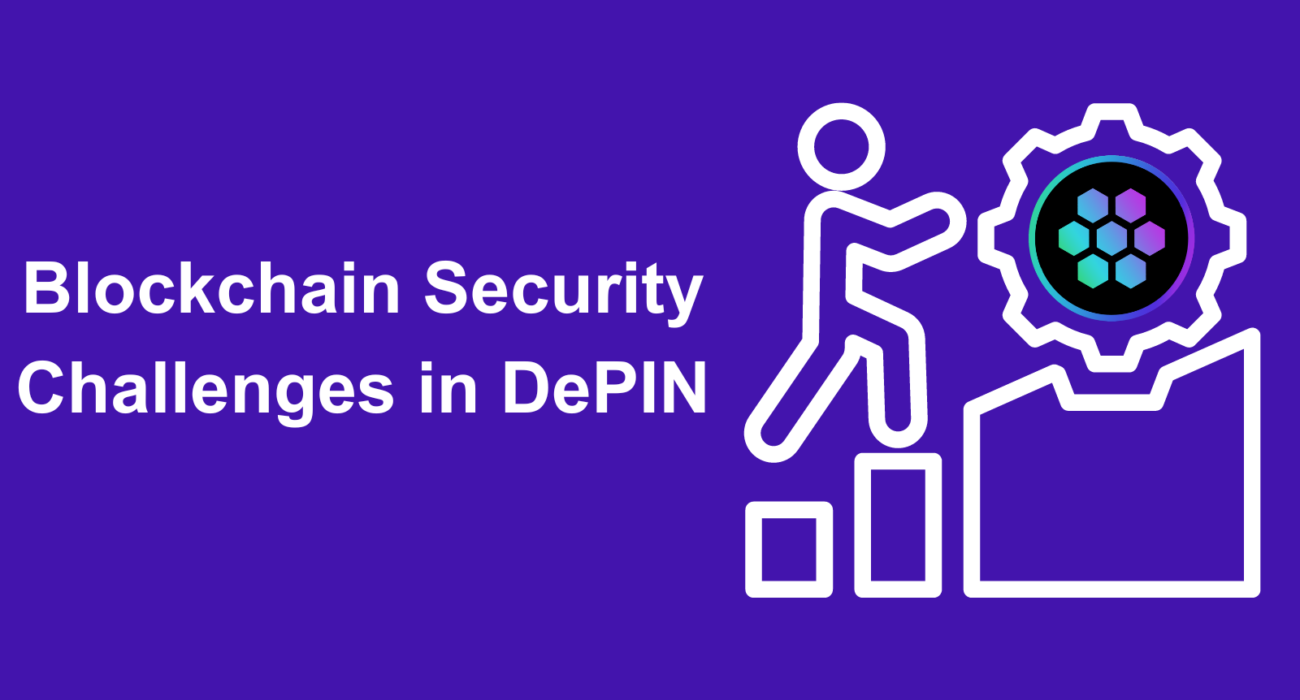As blockchain technology continues to evolve, its integration with decentralized physical infrastructure networks (DePIN) has opened new possibilities for secure, decentralized services. DePIN relies on blockchain to distribute and manage physical infrastructure, reducing the risks of centralized control and bringing more autonomy to the network’s participants. However, with this exciting potential come significant blockchain security challenges in DePIN. While decentralization has many advantages, it also introduces complexities that make security a critical concern. In this blog, we will dive into the key security challenges that DePIN faces, explore why these issues matter, and examine how we can address them.
Understanding DePIN
Before we delve into the blockchain security challenges in DePIN, let’s first establish what DePIN actually is.
DePIN, short for Decentralized Physical Infrastructure Network, refers to a system where physical infrastructure—such as telecommunications, energy grids, and cloud storage—is managed in a decentralized manner. Instead of relying on a single, centralized authority to operate and maintain these infrastructures, DePIN spreads control across multiple participants, creating a more resilient and adaptable network.
This decentralized approach, powered by blockchain, enables users to share resources, contribute to the infrastructure, and engage in peer-to-peer transactions. Blockchain security challenges in DePIN arise as these decentralized systems grow, requiring robust measures to ensure the integrity of the network and the protection of user data.
Why Security is Critical in DePIN Networks
Security is essential in any digital system, but in a decentralized network like DePIN, it becomes even more critical. With no central authority overseeing the network, participants rely on the blockchain to ensure the security and validity of their transactions. A breach in security can undermine the entire system, leading to loss of trust and, potentially, the collapse of the network.
The blockchain security challenges in DePIN are particularly pressing because DePIN networks handle sensitive information such as financial data, personal identifiers, and critical infrastructure operations. If these systems are compromised, the consequences could be severe, ranging from data theft to operational failures in infrastructure.
This makes security not just a technical concern but a foundational requirement for DePIN’s success.
Key Blockchain Security Challenges in DePIN
Let’s explore the major blockchain security challenges in DePIN that need to be addressed to ensure a safe and reliable network.
1. Consensus Vulnerabilities
At the heart of every blockchain is the consensus mechanism—a process that allows decentralized participants to agree on the validity of transactions without relying on a central authority. In DePIN, these consensus protocols are vital for keeping the network synchronized and trustworthy.
However, consensus mechanisms come with vulnerabilities. The most notorious of these is the 51% attack, where a malicious entity gains control of more than half of the network’s computing power. This would allow them to manipulate transactions and rewrite the blockchain’s history. In a DePIN network, such an attack could cause catastrophic failures, compromising both digital and physical infrastructure.
Another issue is the Sybil attack, where attackers create numerous fake identities to overwhelm the network and gain control. These consensus vulnerabilities pose significant blockchain security challenges in DePIN, as they threaten the integrity and stability of the network.
2. Smart Contract Exploits
Smart contracts are self-executing contracts where the terms are written directly into code. They play a crucial role in DePIN by automating transactions and ensuring that agreements are carried out without the need for intermediaries. However, smart contracts are only as secure as the code that defines them.
Poorly written or inadequately audited smart contracts can contain bugs or vulnerabilities that hackers can exploit to manipulate outcomes, steal assets, or disrupt the network. In DePIN networks, these smart contract exploits represent a major blockchain security challenge, as they can lead to financial loss or operational disruptions if not properly addressed.
3. Privacy and Data Protection
While blockchain technology offers transparency, it also raises concerns about privacy. In DePIN, participants share and manage physical infrastructure, often transmitting sensitive information across the network. The decentralized nature of blockchain means that this information is distributed across multiple nodes, potentially exposing it to unauthorized access.
Maintaining privacy and data protection is one of the top blockchain security challenges in DePIN. A breach could expose personal data or critical infrastructure information, leading to legal, financial, or operational repercussions.
4. Scalability and Security Trade-offs
As DePIN networks grow, they must balance scalability with security. Blockchain systems can struggle to handle large numbers of transactions efficiently while maintaining high levels of security. This scalability issue is particularly problematic in DePIN, where both digital and physical infrastructure rely on the network’s smooth operation.
Many solutions to scalability, such as reducing block sizes or simplifying consensus mechanisms, can compromise security. This trade-off is one of the core blockchain security challenges in DePIN that must be carefully managed to ensure the network remains both efficient and secure.
5. Interoperability Risks
DePIN networks often need to interact with other blockchain platforms, either to facilitate transactions or share infrastructure. This interaction introduces interoperability risks, where security weaknesses in one blockchain can compromise the security of the entire network.
The challenge of ensuring secure communication between different blockchains is one of the key blockchain security challenges in DePIN. Without strong interoperability protocols, DePIN networks risk exposure to external vulnerabilities.
Solutions and Best Practices for Enhancing Blockchain Security in DePIN
Addressing the blockchain security challenges in DePIN requires a combination of advanced technology, careful planning, and adherence to best practices. Below are some solutions to these challenges:
1. Improving Consensus Mechanisms
Strengthening consensus protocols can reduce the risk of attacks like 51% or Sybil attacks. Solutions such as Proof of Stake (PoS) and Byzantine Fault Tolerance (BFT) can make it harder for malicious actors to take control of the network. Regular updates and community involvement are also key to keeping consensus mechanisms secure.
2. Smart Contract Audits
Smart contracts should be rigorously tested and audited before being deployed in DePIN networks. This helps to identify and address vulnerabilities before they can be exploited. Using automated tools for code verification and engaging third-party security firms for audits are both best practices for ensuring smart contract security.
3. Enhanced Privacy Measures
To address privacy concerns, DePIN networks can adopt privacy-enhancing technologies like zero-knowledge proofs, which allow transactions to be verified without revealing sensitive information. Encryption and anonymization techniques can also help protect user data while still maintaining the transparency that blockchain provides.
4. Scaling Securely
While scalability is a challenge, there are ways to scale DePIN networks without compromising security. Layer 2 solutions, such as state channels or sidechains, allow for off-chain transactions that reduce the load on the main blockchain. This helps to improve scalability while still ensuring that security is maintained.
5. Interoperability Protocols
Developing strong interoperability protocols is crucial for ensuring secure interactions between DePIN and other blockchains. These protocols should include secure communication channels, multi-signature wallets, and cross-chain bridges that reduce the risk of security breaches.
Unlock the future of decentralized networks by investing in SRP Token! Join the revolution and fuel the growth of blockchain and DePIN for unmatched security and innovation.
Future of Security in DePIN Networks
Looking ahead, the future of security in DePIN networks will be shaped by emerging technologies and evolving best practices. As blockchain security challenges in DePIN continue to evolve, it will be crucial to stay ahead of potential threats through innovation and collaboration.
Technologies such as quantum-resistant cryptography and artificial intelligence-driven security systems hold promise for further enhancing blockchain security. Additionally, continuous community involvement and transparent governance will play a key role in maintaining trust and integrity within DePIN networks.
Conclusion
In summary, blockchain security challenges in DePIN are multifaceted and require a proactive approach to ensure that decentralized physical infrastructure networks remain secure. From consensus vulnerabilities to smart contract exploits and interoperability risks, these challenges must be addressed through a combination of technological innovation, best practices, and ongoing vigilance.
By tackling these issues head-on, DePIN networks can realize their full potential, offering secure, scalable, and efficient infrastructure solutions for the future.

 China
China Russia
Russia India
India









